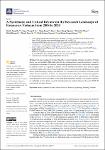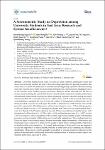Search
Author
- Manh-Toan Ho (2)
- Minh-Hoang Nguyen (2)
- Ngoc-Thang B. Le (2)
- Hung-Long D. Tran (1)
- next >
Subject
- China (1)
- Corruption (1)
- depressive disorder (1)
- Discursive Pre-emption (1)
- next >
Date issued
Has File(s)
Search Results
This paper endeavors to understand the research landscape of finance research in Vietnam during the period 2008 to 2020 and predict the key defining future research directions. Using the comprehensive database of Vietnam’s international publications in social sciences and humanities, we extract a dataset of 314 papers on finance topics in Vietnam from 2008 to 2020. Then, we apply a systematic approach to analyze four important themes: Structural issues, Banking system, Firm issues, and Financial psychology and behavior. Overall, there have been three noticeable trends within finance research in Vietnam: (1) assessment of financial policies or financial regulation, (2) deciphering the correlates of firms’ financial performances, and (3) opportunities and challenges in adopting innova... |
Satirical cartooning in Vietnam is subject to a complex dynamic: an increasingly liberalised and internationalised economy, and the rise of social media in a one-party state. This article examines what state-sanctioned satirical cartoons can reveal about the representation and management of political criticism in such a context. We find a growing trend of depicting corruption as a systemic problem, which is present in 45 per cent of the sample and in 70 per cent of the 20 most-viral cartoons in one of Vietnam’s most popular magazines, Tuoi Tre Cuoi (Youth Humour). This trend can be interpreted as a change in the sensibility of audiences and a shift toward a more tolerant media landscape. The trend, however, may also be a worrying sign of the dual dangers of cynicism in Vietnamese po... |
This study adopts the bibliometric approach to identify the key characteristics in the relationship of demographic factors (age, gender, affiliations, and locations), scientific productivity, and the collaboration among development economics researchers in Vietnam during the period 2008–2020. Overall, the number of publications and authors in development economics are rising steeply with the average annual growth rate of nearly 23% and 26%, respectively. Moreover, the ‘quality’ of the research appears to be high as 59% of the articles are published in journals in the first and second quartile according Scimago journal ranking. However, the citation counts for these studies indicate their impacts are far more languishing in comparison. In terms of research trends, this study identifi... |
Given that mental health issues are acute in Asian countries, particularly Japan and Korea, and university students are more vulnerable to depression than the general population, this study aims to examine the landscapes of scientific research regarding depressive disorders among university students and evaluate the effectiveness of international collaboration and funding provision on the scientific impact in Korea, Japan, and China. Based on articles retrieved from the Web of Science database during the period 1992–2018, we found that the number of scientific publications, international collaborations, and allocated funds regarding depressive disorder among university students in China (97 articles, 43 international collaborations, and 52 funds provided, respectively) overwhelmingl... |



